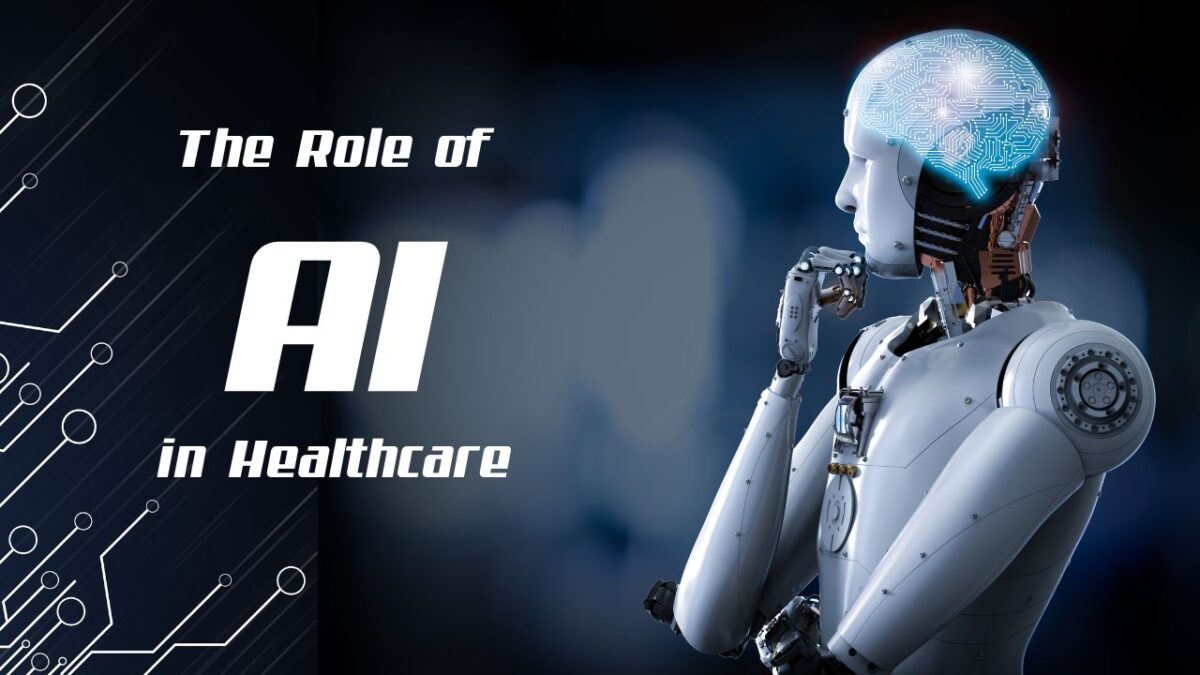10 Benefits of Artificial Intelligence in Healthcare

In today’s rapidly evolving healthcare landscape, artificial intelligence (AI) stands as a beacon of innovation, promising to revolutionize patient care and clinical practices. With its remarkable ability to analyze vast amounts of data and derive valuable insights, AI is reshaping the way healthcare is delivered, from diagnosis to treatment. As the demand for more efficient and personalized healthcare solutions continues to grow, AI emerges as a powerful tool capable of meeting these challenges head-on. In this interesting blog post, we will delve into the 10 Benefits of Artificial Intelligence in Healthcare and explore how it is poised to transform the industry, ushering in a new era of precision medicine and improved patient outcomes.
- Enhanced Diagnostics: AI’s role in healthcare extends far beyond mere data analysis; it serves as a powerful ally in enhancing diagnostics. By leveraging AI-powered algorithms, healthcare professionals gain access to a level of diagnostic accuracy that was previously unimaginable. These algorithms can meticulously analyze a plethora of medical images, lab results, and patient data with unparalleled precision, empowering clinicians to swiftly and accurately identify potential health issues. This capability not only expedites the diagnostic process but also ensures that patients receive timely and accurate assessments, leading to more effective treatment plans and ultimately better health outcomes.
- Personalized Treatment Plans: Artificial intelligence (AI) is revolutionizing healthcare by facilitating the development of personalized treatment plans tailored to the unique needs of each patient. By harnessing the power of AI, healthcare providers can analyze a wealth of individual patient data, ranging from genetic information to medical history. This in-depth analysis enables AI algorithms to discern subtle patterns and correlations that may escape the human eye. As a result, AI can recommend treatments that are not only more effective but also precisely targeted to address the specific health concerns of each patient. This personalized approach to healthcare ensures that patients receive treatments that are tailored to their individual needs, maximizing the likelihood of positive outcomes and minimizing the risk of adverse effects. Ultimately, AI-driven personalized treatment plans represent a significant advancement in patient care, offering the potential to revolutionize the way we approach healthcare delivery.
- Predictive Analytics: 10 Benefits of Artificial Intelligence in Healthcare AI algorithms have the remarkable capability to sift through immense volumes of patient data, analyzing it for patterns and trends that may not be immediately apparent to healthcare providers. By detecting subtle correlations and identifying potential risk factors, AI can help healthcare providers predict and prevent adverse health events before they occur. This proactive approach to healthcare represents a significant paradigm shift, moving away from reactive treatments toward preventative interventions. By intervening early to mitigate health risks, healthcare providers can significantly improve patient outcomes and reduce the likelihood of serious complications. Moreover, this proactive approach has the potential to yield substantial cost savings by preventing the need for expensive treatments and hospitalizations. Overall, leveraging AI to predict and prevent adverse health events represents a transformative advancement in healthcare, promising to usher in a new era of preventive medicine and improved patient care.
- Robotic Surgery: AI-powered robotic surgery systems represent a groundbreaking advancement in surgical technology, ushering in a new era of precision and control in the operating room. These sophisticated systems enable surgeons to perform complex procedures with unparalleled accuracy and dexterity, surpassing the capabilities of traditional surgical methods. By harnessing the power of AI, surgeons can execute intricate maneuvers with precision, minimizing the risk of errors and complications. Additionally, robotic surgery allows for minimally invasive techniques, reducing trauma to the patient’s body and resulting in shorter recovery times and improved postoperative outcomes. Patients undergoing robotic-assisted procedures experience less pain, reduced scarring, and faster recovery, leading to enhanced overall satisfaction with their surgical experience. Moreover, the integration of AI into surgical systems enables real-time feedback and optimization, further enhancing surgical precision and patient safety. As robotic surgery continues to evolve, it promises to revolutionize the field of surgery, offering patients access to safer, more effective treatments and significantly improving surgical outcomes.
- Drug Discovery and Development: AI’s role in drug discovery is transformative, propelling the pharmaceutical industry into a new era of innovation and efficiency. By leveraging advanced algorithms to sift through vast datasets, AI can swiftly identify promising drug candidates with unprecedented accuracy and speed. This capability revolutionizes the traditional drug discovery process, which often involves years of laborious research and testing. With AI at the helm, researchers can rapidly assess the molecular structures of compounds, predict their efficacy, and anticipate potential side effects. This accelerated pace of drug discovery holds immense promise for addressing unmet medical needs and developing treatments for a myriad of diseases and conditions, from rare genetic disorders to widespread chronic illnesses. Furthermore, AI-driven drug discovery enables a more targeted approach to treatment development, tailoring therapies to specific molecular targets and patient populations. This precision medicine paradigm promises to usher in a new era of personalized healthcare, where treatments are tailored to the individual characteristics of each patient. As AI continues to refine its capabilities in drug discovery, the possibilities for medical breakthroughs are limitless, offering hope for improved patient outcomes and enhanced quality of life for millions around the globe.
- Virtual Health Assistants: AI-powered virtual assistants represent a groundbreaking advancement in healthcare accessibility and support, offering patients unprecedented access to information and assistance around the clock. With the ability to provide personalized responses to medical inquiries, these virtual assistants serve as invaluable resources for individuals seeking guidance on a wide range of health-related topics. Whether its answering questions about symptoms, offering medication reminders, or providing tips for managing chronic conditions, AI-powered virtual assistants empower patients to take control of their health and well-being with confidence and ease. Moreover, the round-the-clock availability of these virtual assistants ensures that patients can access support whenever they need it, regardless of time or location. This continuous access to healthcare information and support enhances patient engagement, fosters better communication between patients and healthcare providers, and ultimately leads to improved health outcomes. As AI technology continues to evolve, virtual assistants will play an increasingly integral role in healthcare delivery, providing patients with personalized, accessible, and effective support whenever they need it most.
- Administrative Efficiency: AI technologies are revolutionizing administrative tasks within the healthcare industry, offering unprecedented efficiency and productivity gains. Through the automation of tasks like appointment scheduling, medical billing, and insurance processing, AI streamlines operations and reduces the administrative burden on healthcare professionals. By leveraging advanced algorithms and machine learning capabilities, AI systems can accurately manage patient appointments, process billing information, and handle insurance claims with minimal human intervention. This automation not only saves time and resources but also reduces the likelihood of errors and delays in administrative processes. As a result, healthcare professionals can devote more time and attention to delivering high-quality patient care, ultimately improving patient satisfaction and outcomes. With AI technologies driving administrative efficiency in healthcare, organizations can optimize their workflows, enhance operational performance, and ensure the seamless delivery of care to patients.
- Telemedicine: 10 Benefits of Artificial Intelligence in Healthcare AI-enabled telemedicine platforms represent a groundbreaking advancement in healthcare delivery, offering unparalleled accessibility and convenience for patients worldwide. By harnessing the power of artificial intelligence, these platforms facilitate remote consultations between patients and healthcare providers, breaking down geographical barriers and expanding access to quality care. This is especially crucial for individuals residing in rural or underserved areas, where access to traditional healthcare services may be limited or nonexistent. With AI-driven telemedicine solutions, patients can easily connect with healthcare professionals from the comfort of their own homes, eliminating the need for lengthy travel or wait times. This not only enhances convenience for patients but also enables timely access to medical expertise, potentially saving lives in emergency situations. Additionally, AI technology enhances the telemedicine experience by facilitating features such as real-time translation, symptom analysis, and remote monitoring, further optimizing the quality of care delivered remotely. As telemedicine continues to evolve with AI integration, it holds tremendous promise for improving healthcare access and outcomes on a global scale.
- Disease Surveillance and Monitoring: AI’s ability to analyze real-time data plays a crucial role in monitoring disease outbreaks and tracking public health trends. By swiftly processing vast amounts of information from various sources, including social media, healthcare records, and environmental data, AI can provide early detection of potential disease outbreaks. This proactive approach enables healthcare authorities to identify at-risk populations and implement targeted interventions to contain the spread of infectious diseases effectively. Moreover, AI algorithms can predict the trajectory of outbreaks, anticipate disease hotspots, and allocate resources strategically to areas most in need. This data-driven approach not only enhances the efficiency of public health responses but also saves lives by facilitating timely interventions. Additionally, AI-powered predictive analytics can forecast future healthcare needs, enabling policymakers to develop proactive strategies for disease prevention and management. Overall, AI’s capacity to analyze real-time data is instrumental in safeguarding public health and mitigating the impact of infectious disease outbreaks.
- Continuous Learning and Improvement: AI algorithms possess the remarkable capability to learn from experience and enhance their performance iteratively over time. Through the analysis of vast datasets and real-world interactions, these algorithms can identify patterns, extract insights, and adapt their decision-making processes accordingly. This iterative learning process allows AI-powered healthcare solutions to continually evolve and improve, ensuring that they remain at the forefront of innovation in patient care and clinical practice. As algorithms accumulate more data and encounter a wider range of scenarios, they become increasingly adept at identifying subtle patterns and making more accurate predictions. This continuous refinement of AI algorithms not only enhances the effectiveness of diagnostic tools and treatment recommendations but also fosters greater trust and confidence among healthcare providers and patients. By leveraging the power of machine learning and data-driven insights, AI holds the potential to revolutionize healthcare delivery and improve patient outcomes on a global scale.
In conclusion, the 10 Benefits of Artificial Intelligence in Healthcare offer a vast array of opportunities to revolutionize the healthcare landscape. From streamlining administrative tasks to expanding access to personalized treatment plans, AI has the potential to reshape the way healthcare is delivered and experienced. By harnessing the power of AI algorithms, healthcare providers can make faster and more accurate diagnoses, leading to improved patient outcomes and reduced healthcare costs. Additionally, AI-enabled telemedicine platforms are breaking down barriers to access, allowing patients to receive care remotely from the comfort of their own homes. As AI continues to evolve and advance, the possibilities for innovation in healthcare are virtually limitless. With continued investment and research in AI technology, the future of healthcare looks brighter than ever before, promising a world where quality care is accessible to all, regardless of geographic location or socioeconomic status.








